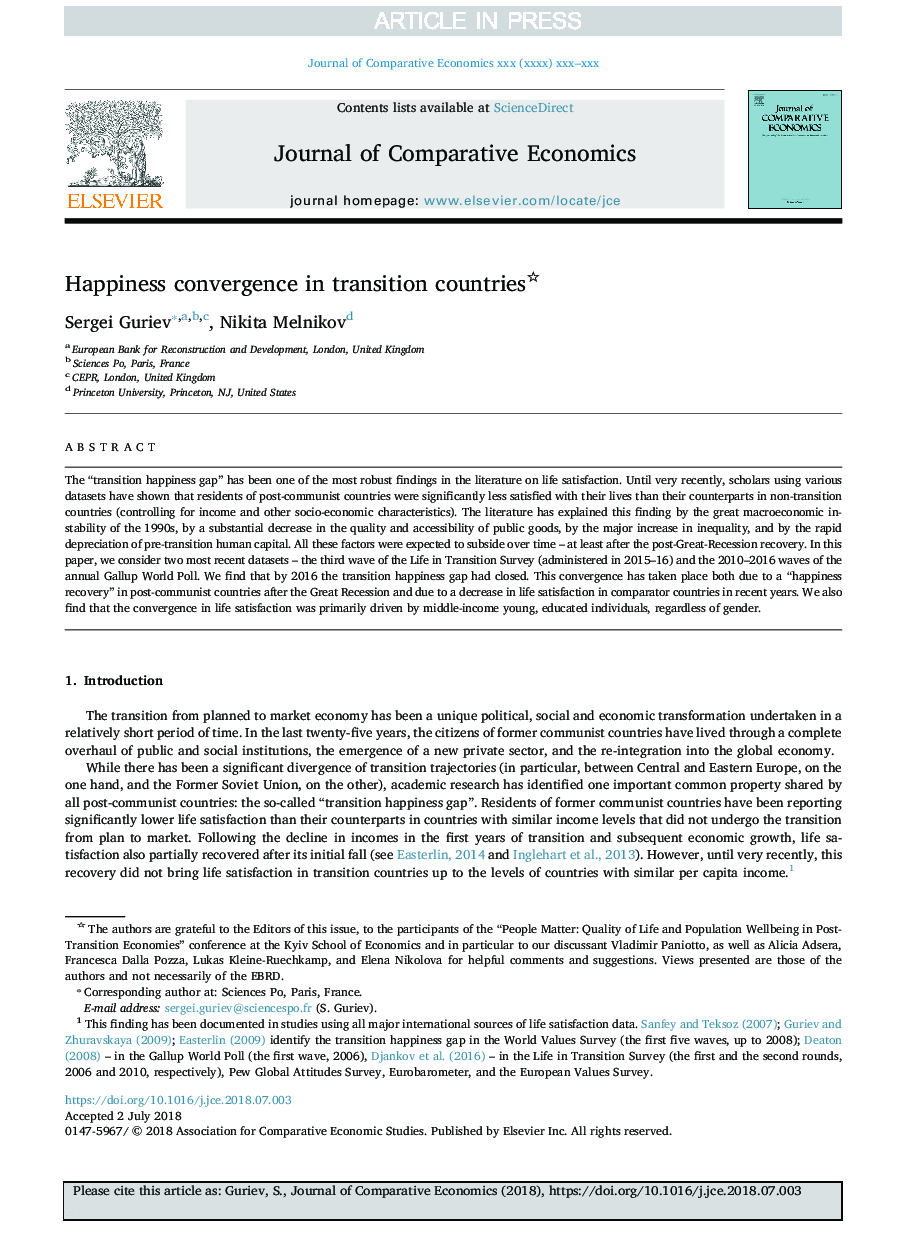| کد مقاله | کد نشریه | سال انتشار | مقاله انگلیسی | نسخه تمام متن |
|---|---|---|---|---|
| 10153661 | 1666220 | 2018 | 25 صفحه PDF | دانلود رایگان |
عنوان انگلیسی مقاله ISI
Happiness convergence in transition countries
ترجمه فارسی عنوان
همبستگی شادی در کشورهای در حال گذار
دانلود مقاله + سفارش ترجمه
دانلود مقاله ISI انگلیسی
رایگان برای ایرانیان
ترجمه چکیده
گذر شادی؟ یکی از قوی ترین یافته های در ادبیات رضایت از زندگی بوده است. تا همین اواخر، محققان با استفاده از مجموعه داده های مختلف نشان داده اند که ساکنان کشورهای پسا کمونیستی نسبت به همتایان خود در کشورهای غیرمستقیم (کنترل درآمد و دیگر ویژگی های اقتصادی و اجتماعی) نسبت به زندگی خود نسبت به دیگران بسیار کمتر است. ادبیات این یافته را با بی ثباتی اقتصاد کلان دهه 1990، با کاهش قابل توجهی در کیفیت و دسترسی به کالاهای عمومی، افزایش قابل ملاحظه نابرابری و کاهش سریع سرمایه گذار انسانی، پیش بینی کرده است. انتظار میرود تمام این عوامل در طی زمان کاهش یابد - حداقل پس از بهبود پس از رکود بزرگ. در این مقاله، ما دو مجموعه داده جدید را در نظر می گیریم - سومین موج «بررسی زندگی در انتقال» (در سال 2015-2015) و امواج سالانه 2010-2016 نظرسنجی جهانی گالوپ. ما دریافتیم که تا سال 2016 شکاف شادی گذار بسته شده است. این همگرایی به واسطه یک ریاضی خوشبختی رخ داده است؟ در کشورهای پست کمونیستی پس از رکود بزرگ و به علت کاهش رضایت از زندگی در کشورهای همپا در سال های اخیر. ما همچنین دریافتیم که همگرایی در رضایت از زندگی در درجه اول به وسیله افراد جوان و تحصیلکرده با درآمد متوسط، بدون در نظر گرفتن جنس، هدایت می شود.
موضوعات مرتبط
علوم انسانی و اجتماعی
اقتصاد، اقتصادسنجی و امور مالی
اقتصاد و اقتصادسنجی
چکیده انگلیسی
The “transition happiness gap” has been one of the most robust findings in the literature on life satisfaction. Until very recently, scholars using various datasets have shown that residents of post-communist countries were significantly less satisfied with their lives than their counterparts in non-transition countries (controlling for income and other socio-economic characteristics). The literature has explained this finding by the great macroeconomic instability of the 1990s, by a substantial decrease in the quality and accessibility of public goods, by the major increase in inequality, and by the rapid depreciation of pre-transition human capital. All these factors were expected to subside over time - at least after the post-Great-Recession recovery. In this paper, we consider two most recent datasets - the third wave of the Life in Transition Survey (administered in 2015-16) and the 2010-2016 waves of the annual Gallup World Poll. We find that by 2016 the transition happiness gap had closed. This convergence has taken place both due to a “happiness recovery” in post-communist countries after the Great Recession and due to a decrease in life satisfaction in comparator countries in recent years. We also find that the convergence in life satisfaction was primarily driven by middle-income young, educated individuals, regardless of gender.
ناشر
Database: Elsevier - ScienceDirect (ساینس دایرکت)
Journal: Journal of Comparative Economics - Volume 46, Issue 3, September 2018, Pages 683-707
Journal: Journal of Comparative Economics - Volume 46, Issue 3, September 2018, Pages 683-707
نویسندگان
Sergei Guriev, Nikita Melnikov,
